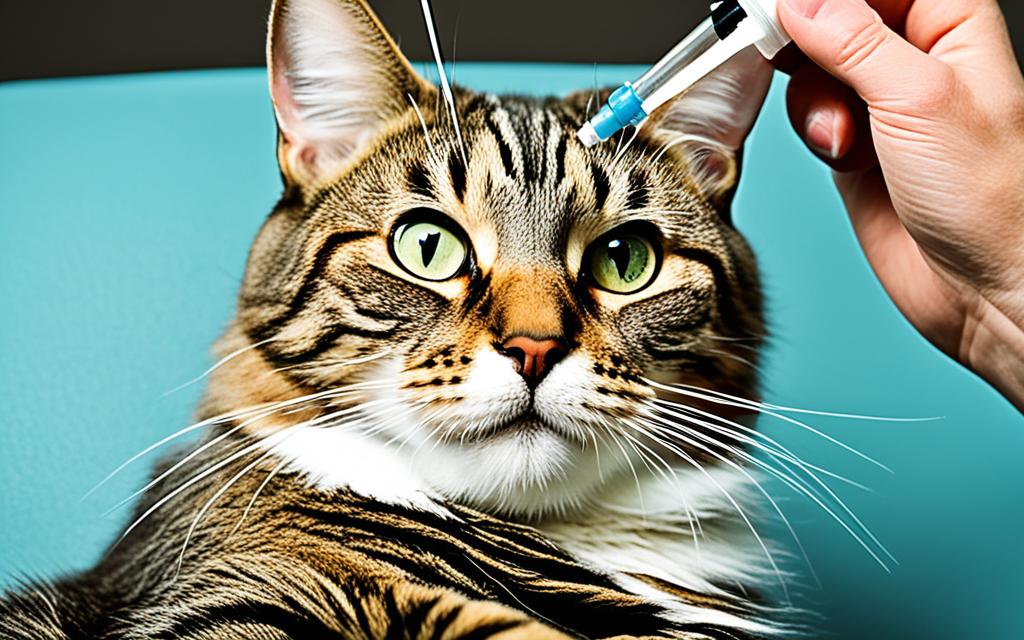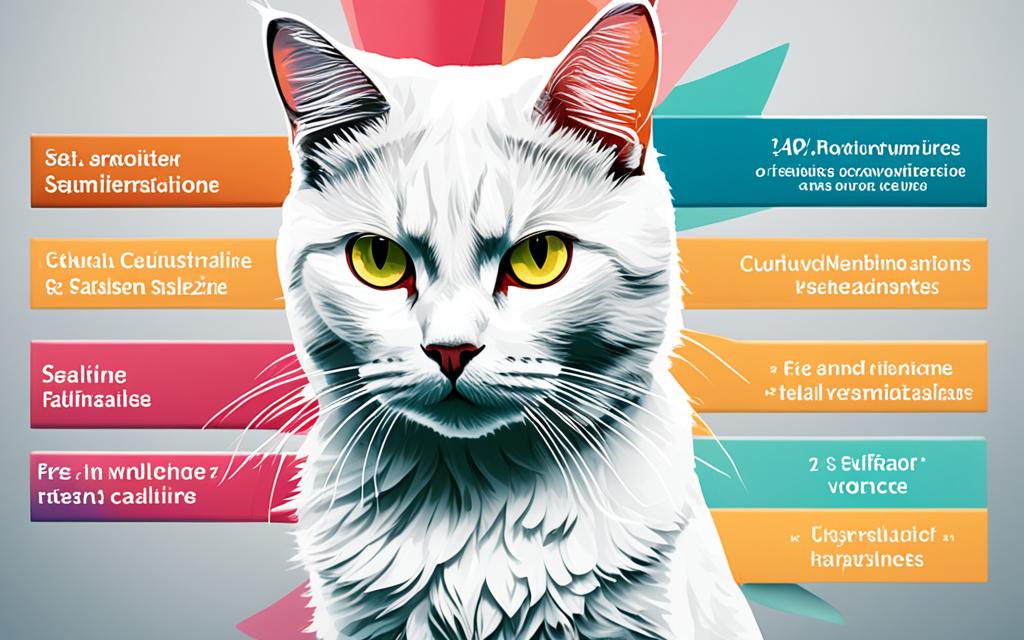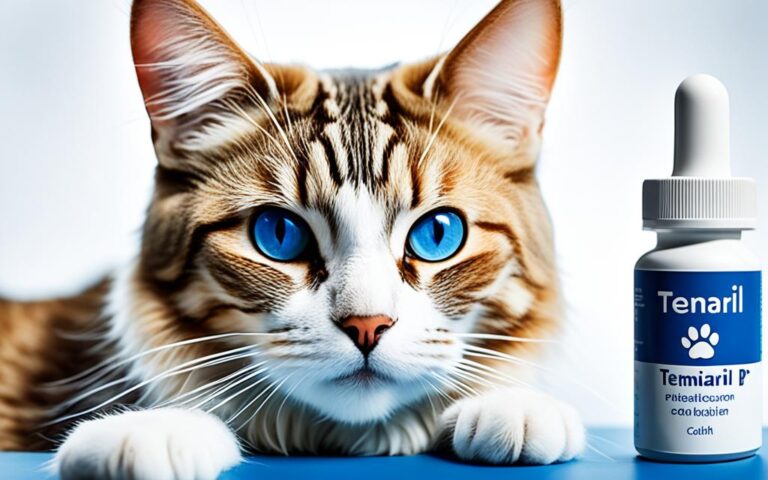Sulfasalazine for cats: Uses, Benefits, and Side Effects
Did you know that Sulfasalazine, a mix of a sulfa antibiotic and salicylic acid salt, is used for cat health? It’s mainly for treating colitis or inflammation in the gut. Symptoms may show as bloody or mucous diarrhea, a need to use the litter box often, and sometimes throwing up1. This medicine can contain salicylates. Cats might need different doses because of this1.
Key Takeaways
- Sulfasalazine is used to treat colitis and inflammatory bowel disease in cats.
- Cats require dose adjustments due to sensitivity to the salicylate component.
- Potential side effects include decreased appetite, vomiting, joint inflammation, and more.
- Possible drug interactions with Sulfasalazine include antacids, aspirin, and other medications.
- Immediate veterinary attention is crucial if a cat experiences an allergic reaction or adverse effects.
Table of Contents
What is Sulfasalazine?
Understanding the Composition and Purpose
Sulfasalazine is a special prescription drug. It helps with bowel issues like colitis in cats and dogs2. This medicine combines a sulfa drug, sulfapyridine, with a salt of aspirin. This mix reduces swelling and eases the gut problems linked to these conditions3. It falls under the group of anti-inflammatory medicines. What makes it stand out is that it breaks down in the body. This release the active compound, 5-ASA, to target the inflammation in the colon2.
This drug is approved by the FDA for humans. But, it’s not yet fully green-lighted for use in animals. Still, vets can prescribe it when needed2. Some pets, like certain dog breeds and cats, might react strongly to this medicine2.
Sulfasalazine is a unique medication that combines a sulfa antibiotic and a salicylic acid salt to effectively treat inflammatory bowel conditions in cats and dogs.
“Sulfasalazine is a prescription medication used for the treatment of colitis in dogs and cats and vasculitis in dogs.”2
Sulfasalazine for Cats: Dosage and Administration
Sulfasalazine helps cats with gut issues like IBD and colitis. It is necessary to carefully follow your vet’s advice4.
The recommended sulfasalazine dose is 5 to 10 mg per pound every 12 to 24 hours4. Always give it with food to reduce side effects4.
It comes in liquid and pill forms, picked by your vet for your cat4. If you miss a dose, give it when you remember. But, don’t double dose if it’s almost time for the next one4.
Always keep fresh water available for your cat. It helps with hydration and makes the medication work better4.
Things like how much to give and how often can change based on your cat’s health and how they react. Always rely on your vet’s tips. Watch for side effects or any change in their health4.

For successful treatment, stick with the plan your vet gave you. Keep in touch with your vet. Together, you can care well for your cat’s stomach issues4.
Potential Side Effects and Precautions
Sulfasalazine can help cats with certain health issues, but it’s key to know about the risks5. Cats might have less appetite, vomit, or make fewer tears causing dry eyes5. They could also face rare but severe issues like allergies, blood problems, or liver damage5.
Monitoring for Adverse Reactions
Cats with past liver or kidney problems should be carefully watched when using this medicine5. Watch for signs like eye pain, fever, or skin redness. If you notice these, call the vet right away5. Regular blood and urine tests are a must during the treatment6.
Older patients, over 65, might need a smaller dose of sulfasalazine6. Kids as young as 6 can also take it for some illnesses, but with care6. Quick medical help is needed for certain effects, like severe allergies or liver issues6.
People using sulfasalazine need to stay away from the sun, wear sunblock and protective clothes, and skip tanning beds6. Drinking lots of water is also a good idea while on this medication6.
Keep sulfasalazine away from kids and pets in a cool, dry place. Toss any leftover medicine after it expires6.
“Sulfasalazine is a medication that can be effective in treating certain conditions in cats, but it’s crucial to be aware of the potential side effects and take appropriate precautions.”
By knowing the risks and how to prevent them, cat owners can better care for their pets taking sulfasalazine576.
Contraindications and Interactions
When using sulfasalazine in cats, it’s important to know about contraindications and interactions. This drug is not officially approved for cats but is sometimes used off-label8. It might not be safe for pets with certain health conditions or for those who are pregnant or nursing8.
If a cat is allergic to sulfa drugs or aspirin, they shouldn’t have sulfasalazine8. It’s also bad for dehydrated cats because it can cause kidney stones8. When given with certain drugs like antibiotics or blood thinners, it can cause problems, so be careful8.
Talk to your vet about other medicines your cat takes before starting sulfasalazine8. Blood tests and eye checks might be needed if the treatment is long-term8.
| Contraindications | Drug Interactions |
|---|---|
| Dehydration Sulfa drug or salicylate allergies Liver, kidney, or blood diseases Pregnancy or nursing | Antibacterial agents Chlorpropamide Cyclosporine Digoxin Warfarin |
Keep an eye out for side effects once the cat is on sulfasalazine9. These can include upset stomach, not wanting to eat, and feeling tired9. You might also see their skin and urine turn a yellow-orange color9.
More severe side effects are rare but can happen with sulfasalazine in cats9. These could be changes in hearing, mood, or kidney health, or problems with feeling in their limbs and low blood sugar9. Allergic reactions, blood issues, and liver or muscle problems are also possible, though not common9.
Watch out for symptoms like a bad skin rash, blisters, or trouble breathing9. If you notice something unusual, it’s important to tell a vet or pharmacist. They can help make sure your cat stays healthy9.

“Sulfasalazine should be used with caution in pets, as it can interact with various medications and may cause serious side effects if not monitored closely.”
Sulfasalazine for Cats: Uses, Benefits, and Side Effects
Sulfasalazine helps cats with gut problems10. It fights bowel inflammation and chronic colitis. These issues can cause bloody, mucus-filled diarrhea, urgent bathroom needs, and vomiting in cats10.
Its anti-inflammatory properties are key. They help soothe the digestive system10. With the right dose and given with food, many cats do well on sulfasalazine. It’s a good tool to manage gut problems in cats.
But, knowing the side effects is crucial10. Cats might eat less, vomit, or get dry eyes. A vet’s guidance is very important. They’ll watch over your cat’s reaction to the medicine closely.
Also, sulfasalazine can mix badly with other drugs. These include methotrexate, warfarin, phenylbutazone, and antacids10. Always ask your vet before giving your cat sulfasalazine. They’ll help you use it the right way to avoid problems.
In the end, sulfasalazine can be a great help for certain cat gut problems. But, working closely with your vet is a must. Knowing the good and bad of this medicine helps you take the best care of your cat.
Monitoring and Follow-up Care
Cats taking sulfasalazine need regular vet check-ups. During these visits, vets will do blood tests. This checks how well the liver and kidneys are working. Eye exams are also important. They look for any changes in tear production11.
The vet might change the medicine’s dose or how often it’s given. This depends on how the cat is doing and if there are any side effects11. It’s vital for owners to tell the vet right away if their cat acts differently.
To use sulfasalazine safely and well in cats, regular checks are a must11. The vet could need to do more tests, like checking the gut with a small camera or an ultrasound11. They will also keep an eye on any health issues that might be getting worse.
For cats with ongoing gut problems, the vet might suggest extra vitamins11. Owners play a big role by making sure their cat takes the medicine correctly. They should always keep in touch with the vet if they notice any changes in their cat11.
Working together with the vet is key for the cat’s health. Following the vet’s advice on giving and watching for side effects of sulfasalazine helps a lot11. Quick action over any new symptoms keeps the treatment on track.
Alternative Treatment Options
Instead of just sulfasalazine, other treatments help cats with bowel conditions12. These can be things like changing the diet, adding probiotics, using corticosteroids, or other drugs12. The vet and the owner will team up to pick what’s best. They look at the cat’s health, the problem’s seriousness, and any bad effects from the treatment.
Exploring Other Therapies
Diet changes are big for cats with IBD13. Adding limited ingredient foods can ease diarrhea because they’re easy to digest13. Wet food is also a good choice. Its extra wetness helps cats stay hydrated, digest their food better, and soak up nutrients. This really helps when a cat has diarrhea13. Also, pumpkin is good for adding fiber and nutrients. It makes poop more solid and keeps the tummy healthy during diarrhea13.
Probiotics and electrolytes can also boost a cat’s health with IBD13. They put good bacteria back in the gut and help control when the cat goes to the bathroom13. But, if a cat keeps having diarrhea or it looks bad, a vet must check them out13.
Some medicines like metronidazole and sulfasalazine help with the stomach issues.
Kaolin-pectin can calm down mild diarrhea from over-the-counter13.
If IBD is really bad or not getting better, stronger drugs may be needed12. These help by fighting the problem inside the cat’s body. But, a vet must watch the cat very closely when they’re taking these medicines12.
The best treatment mix for IBD in a cat depends on that cat’s needs and how bad the problem is12. A mix of diet, supplements, and right medicines can work well12.
| Treatment Option | Mechanism of Action | Potential Benefits | Considerations |
|---|---|---|---|
| Dietary Changes | Provide easily digestible nutrients and promote gut health | Manage diarrhea, improve nutrient absorption, and restore digestive balance | Requires trial-and-error to find the most suitable diet |
| Probiotics | Restore healthy gut microbiome and regulate bowel movements | Support digestive function and reduce inflammation | Effectiveness may vary based on the specific probiotic strain |
| Corticosteroids | Reduce inflammation and modulate the immune response | Provide rapid relief of clinical signs | Require careful monitoring and gradual tapering to avoid side effects |
| Immunosuppressive Drugs | Target the underlying immune dysregulation in IBD | Help manage severe or refractory cases of IBD | May take weeks or months to become maximally effective, require close veterinary supervision |
By looking at different treatments, vets and cat parents can find the best care for their pet121314.
“The key to successful management of feline inflammatory bowel disease is a multi-pronged approach that considers the cat’s unique needs and responds accordingly.”
121314
Cost Considerations
The price of sulfasalazine for cats changes based on things like how much, how often, and where you buy it15. It’s wise for owners to talk money with their vet. And, look into help like insurance to cut costs16. Giving the medicine right and follow-up checks are key to using sulfasalazine well and affordably for your cat’s health.
At first, the price tag on sulfasalazine might make you pause. But keeping your cat’s health in check has big pay-offs in the long run17. Vets can point out treatments that don’t break the bank. They’ll also look for options if needed, ensuring quality care for the cat and peace of mind for the owner.
Tackling costs by teaming up with the vet and looking into financial aid or insurance is smart. It helps makes sure your cat gets the care they need to live well1516.
FAQ
What is sulfasalazine and how does it work?
How is sulfasalazine administered to cats?
What are the potential side effects of sulfasalazine in cats?
Are there any contraindications or interactions to be aware of with sulfasalazine?
How is sulfasalazine used to treat inflammatory bowel conditions in cats?
What kind of monitoring and follow-up care is required for cats taking sulfasalazine?
Are there any alternative treatment options for feline inflammatory bowel conditions?
How much does sulfasalazine treatment for cats typically cost?
Source Links
- Sulfasalazine | Texas West Animal Health
- Sulfasalazine for Dogs and Cats
- Mar Vista Animal Medical Center
- Sulfasalazine medication guide
- Sulfasalazine: Side Effects, Uses, Dosage, Interactions, Warnings
- Sulfasalazine: Uses & Side Effects
- Sulfasalazine – an overview | ScienceDirect Topics
- Sulfasalazine | VCA Animal Hospitals
- Sulfasalazine Oral: Uses, Side Effects, Interactions, Pictures, Warnings & Dosing – WebMD
- Sulfasalazine Tablets
- Chronic Enteropathies in Small Animals – Chronic Enteropathies in Small Animals – Merck Veterinary Manual
- Drugs Used to Treat Inflammatory Bowel Disease in Monogastric Animals – Drugs Used to Treat Inflammatory Bowel Disease in Monogastric Animals – Merck Veterinary Manual
- Best Diarrhea Medicine for Cats & Treatment Options [2024]
- Inflammatory Bowel Disease in Dogs and Cats
- Azulfidine EN Tablets: Package Insert – Drugs.com
- Apriso: Dosage, side effects, uses, and more
- No title found







